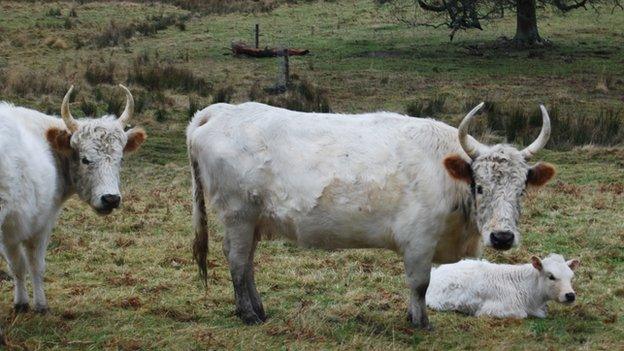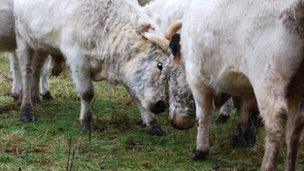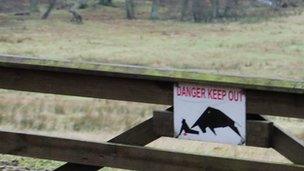Chillingham wild cattle: Surviving another winter
- Published

Chillingham wild cattle breed throughout the year
Richard Marsh is prepared for winter snows and his charges, a herd of 100 rare Chillingham wild cattle, are ready too.
They have been weathering winters in the 360 acre Chillingham Castle park in Northumberland since first being enclosed in about 1240.
"These wild cattle are unique and rarer than the Siberian tiger," Mr Marsh said.
"No human hand touches them and they receive no veterinary care either."
But there are times when human intervention is required. This winter, supplementary feeding has already started.
"By this time of year they've flattened the grass to the ground and any grass there is still growing will have no goodness - it'll all have gone into the root for next year," Mr Marsh said.

Bulls will fight for the right to breed
"Surrounded with a fence means they cannot wander off and find food, so we have to keep them going, probably through to about March, with a couple of round bales of hay a day."
He said that nobody would be able to get close enough to touch them - they simply would not allow you to.
"If humans were to handle them, they would change the way in which they smell. This would lead to any such beast being rejected by the herd and they'd kill them," he said.
They breed throughout the year and calves are often born in the deep snows. Mr Marsh said if they got wet and cold with snow straight away, they could get pneumonia and die.
"But, they are tough little things… they really are," he insisted.
"Their coats have started to ruffle up a little bit - they grow a slightly rougher, longer winter coat in readiness, but the cattle will still live out in the open - their home is the forest.
"Probably the 2010 winter was the worst I have experienced with them.
"I think we only lost 10 or 12 from the whole herd that year, which is not too unusual."
Today, Mr Marsh's daily life is in stark contrast to that when he was a prison officer seven years ago.
It was his love of the outdoors that fortuitously gave him a new direction in life.
'Survival story'
He said: "I served about 18 years as a prison officer, but being at one with nature, my wife and I always came up on walking holidays in this area.
"We came to know the Chillingham area, the cattle and castle very well."
After one holiday, they were offered employment on the estate and that was when Mr Marsh became as close to the herd as he could as their warden.

Mr Marsh said you ignore this sign at your peril
"As well as being responsible for keeping an overall eye on the herd, I come out here every day from Easter to the end of October and simply tell people, on the cattle tour, a survival story of a wonderful herd - against all the odds.
"I can tell the way they stand, the way they look and whether or not they are going to be a bit awkward.
"Generally speaking, you can pick out the ones that will likely be a little bit naughty and you'll keep out of their way - it's all down to leaving them alone. You leave them alone and they'll leave you alone.
"They're not aggressive as such, but they'll defend themselves aggressively."
Mr Marsh, is totally committed to his way of life with the cattle.
He said: "My whole aim in life is to hand on something special to the next generation.
"It would be unforgivable to lose these Chillingham wild cattle - beasts that were here before the Domesday Book was written."